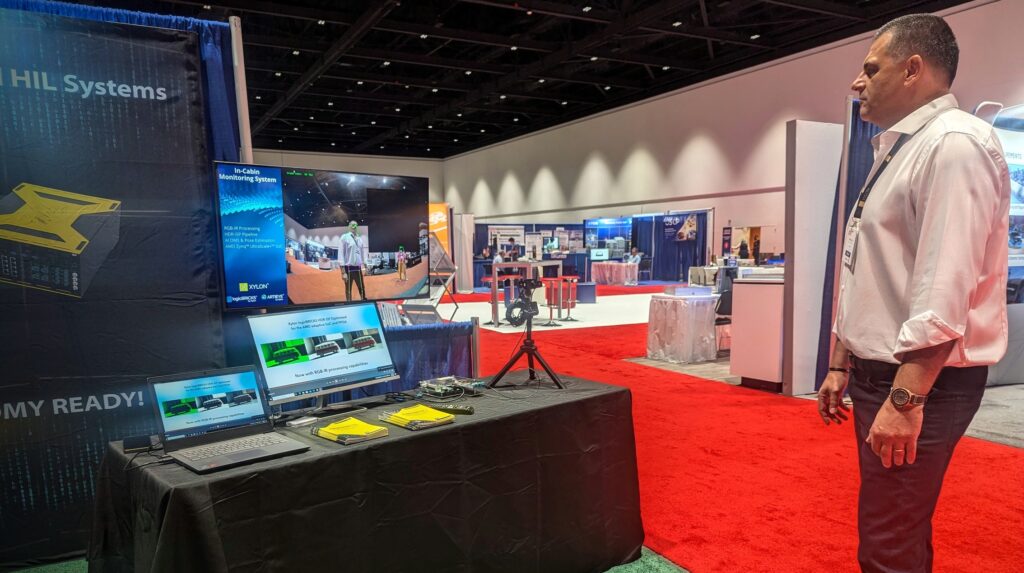The innovations keep coming at the San Jose McEnery Convention Center. Here’s a small taste of what ADAS & Autonomous Vehicle Technology Expo California visitors and delegates have been enjoying on Day 2…
Ontario Tech University shares details on all-weather ADAS testing

The Ontario Tech University/Automotive Centre of Excellence (ACE) core research facility team is in San Jose to talk to visitors about development of functionality to characterize precipitation and test ADAS in situations where weather has soiled the vehicle sensors and affected their ability to detect targets.
According to ACE’s executive director, John Komar, and R&D engineer, Eric Villeneuve, Ontario Tech and ACE are “leading the way in developing new, advanced development routines and testing methodologies for real-world weather conditions”.
The team is sharing with visitors how the world-class Climatic Aerodynamic Wind Tunnel and other environmental chambers provide testing in rain/snow/ice/fog conditions, in varying temperatures and humidity. ACE provides calibrated rain/snow/ice/fog precipitation characterization that accurately and repeatably reproduces real-world performance of lidar, radar, cameras and other optical sensors in full vehicle operation.
Meet Ontario Tech University/Automotive Centre of Excellence at Booth 2020
Xylon demonstrates video processing pipeline for RGB IR sensors that generate RGB and IR images simultaneously

Xylon’s video processing pipeline is designed to enable maximum visibility in all lighting conditions and be used in different in-cabin automotive applications.
Gordan Galic is on the company’s booth and explained more to AAVI: “To demonstrate the benefits of RGB IR technology, as well as qualities of Xylon’s ISP pipeline, the company has built the complete Driver Monitoring and Body Pose Estimation system based on an RGB IR video camera.
“The demo is implemented with the AMD Zynq UltraScale+ adaptive chip. Xylon is an AMD premium partner for adaptive computing and a programmable FPGA/chip design house with 30 years of experience. This enables us to make custom chip devices years before new apps are standardized enough for ASIC implementation in app-specific chips. The adaptive chips enable the implementation of super-fast neural networks and Xylon’s DMS system exploits several neural networks to offer features that surpass the rudimentary offering of the first must-have DMS systems in the market.
“Leading automotive companies are already testing and using the RGB IR technology in different applications,” Galic revealed. “Already published scientific papers give us a glimpse into the future RGB IR use in new ADAS applications, such as a non-contact monitoring of vital signs and recognition of fatal states through monitoring of the driver’s inhalation and heart rate.”
Meet Xylon at Booth 4015
One Silicon Chip Photonics reveals details behind the development of high-precision, low-cost navigational sensors
![]()
One Silicon Chip Photonics is showing visitors how it leverages advances in PIC technology to develop high-precision, low-cost navigational sensors for autonomous vehicles.
The company’s founder and CEO, Kazem Zandi, highlighted that its revolutionary inertial measurement unit is a backbone reference sensor for ADAS, enabling accurate and safe navigation when GPS signal is denied or spoofed.
Speak with Kazem Zandi at Booth 1029 to find out more



